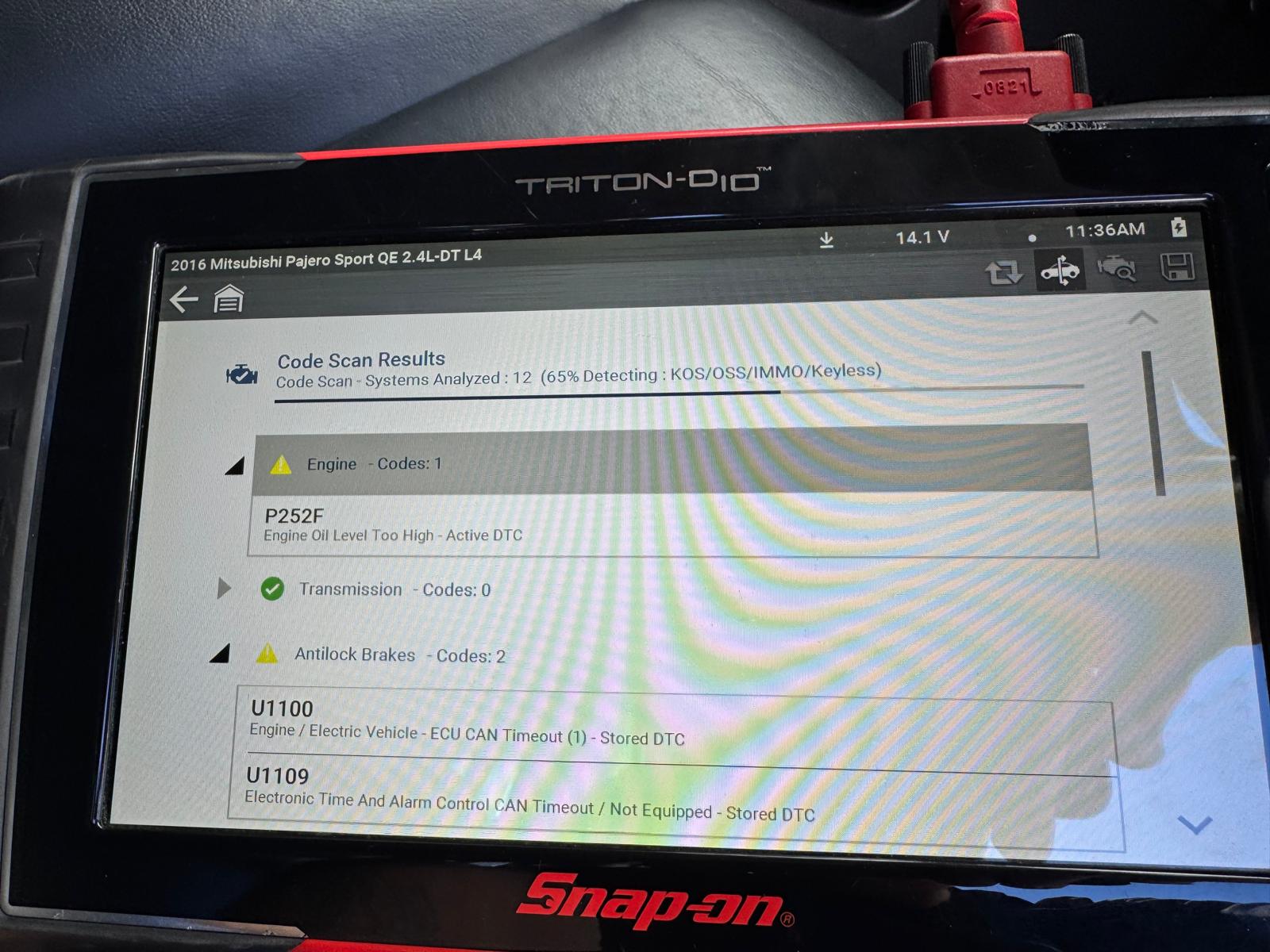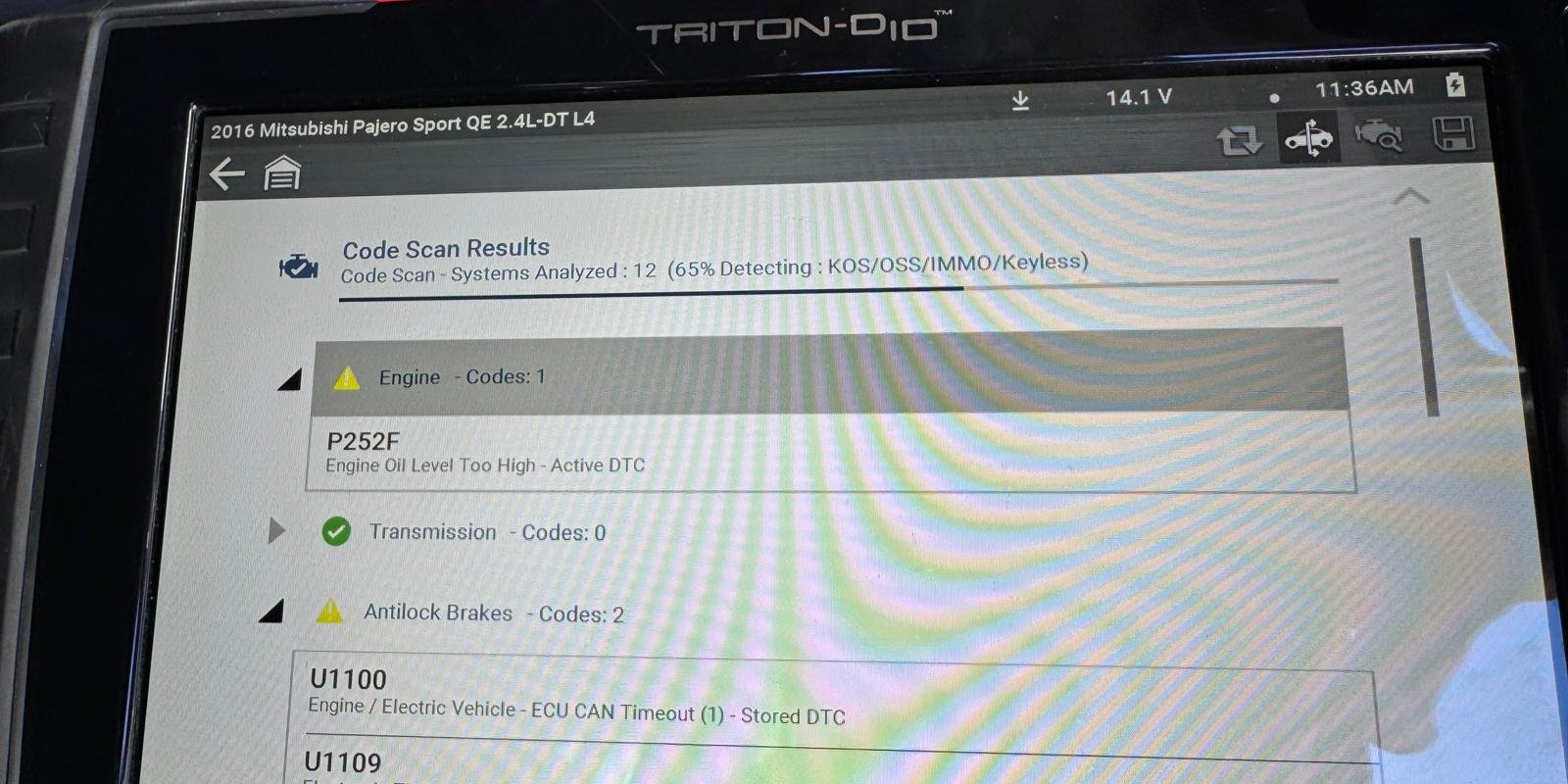Mitsubishi Triton P252F Fault: Engine Oil Level Too High
If you own a Mitsubishi Triton and have encountered the P252F fault code indicating that the engine oil level is too high, it is important to understand the underlying cause. In many DPF-equipped diesel vehicles like the Triton, this issue is often linked to problems with the diesel particulate filter (DPF) regeneration process rather than simply overfilling the oil.
Understanding the P252F Code and Its Link to DPF
The P252F code signals that the engine oil level is higher than normal, which is frequently caused by fuel dilution of the oil. This dilution happens when unburned fuel leaks past the piston rings into the crankcase, raising the oil level. In vehicles equipped with a DPF, this situation commonly results from repeated or failed DPF regeneration events.
During active DPF regeneration, the engine control unit (ECU) injects extra fuel to increase exhaust temperatures and burn off accumulated soot in the DPF. However, if regeneration fails or occurs too frequently—often due to a blocked DPF, short trips that don’t allow full regeneration, or faulty sensors—the excess fuel may not fully combust. This unburned fuel then seeps into the engine oil, causing the oil level to rise and potentially triggering the P252F fault code.
Why Proper DPF Diagnostics Are Critical
Because the P252F code is directly linked to DPF regeneration issues, simply clearing the fault or changing the oil without addressing the root cause will likely result in the fault returning. Proper diagnostics are essential to:
- Identify if the DPF is blocked or damaged.
- Check the condition and operation of sensors involved in the regeneration process.
- Determine if forced regeneration or DPF cleaning is necessary.
- Prevent further fuel dilution and engine damage.
For professional DPF cleaning and maintenance, Clean Flow DPF offers expert services tailored to restore your vehicle’s diesel particulate filter performance efficiently and reliably.

Common Causes Leading to Failed or Frequent DPF Regenerations
- Blocked or clogged DPF filter due to soot and ash buildup.
- Short trips or stop-start driving that prevent full regeneration cycles.
- Faulty sensors, such as pressure sensors or temperature sensors, giving incorrect data to the ECU.
- Sensor hose leaks or damage affecting accurate pressure readings.
- Engine issues causing incomplete combustion or excess soot production.
Solutions and Maintenance Recommendations
Professional DPF Cleaning
To restore proper DPF function and prevent regeneration failures, we offer a mobile on-car chemical cleaning service. This method uses specialized cleaning fluids applied directly to the DPF while it remains installed on the vehicle, effectively removing soot and ash buildup without the need for removal or risking damage to the filter substrate. Our mobile service provides a convenient and efficient solution to maintain your DPF’s performance and extend its lifespan.
Sensor Inspection and Repair
Regular inspection and maintenance of DPF sensors and sensor hoses are vital. Replacing faulty sensors or repairing damaged hoses ensures accurate regeneration control and prevents unnecessary fuel injection.
Forced Regeneration
In some cases, initiating a forced regeneration cycle via diagnostic tools or performing sustained highway driving at appropriate speeds can help burn off accumulated soot, reduce fuel dilution, and clear the fault.
Engine Oil Management
After resolving the DPF issues, it is important to change the engine oil and filter to remove fuel-contaminated oil and restore proper lubrication.
Our Part A Assessment Service
To accurately diagnose and resolve P252F faults related to DPF regeneration and engine oil level, we offer a comprehensive Part A Assessment. This service includes:
- Fault code reading and analysis.
- DPF inspection for blockages.
- Sensor and sensor hose testing.
- Oil level and quality check.
- Forced regeneration if necessary.
Our expert team uses advanced diagnostic tools to ensure your Mitsubishi Triton is correctly serviced, preventing recurring faults and costly repairs.
Conclusion
The P252F engine oil level too high fault in Mitsubishi Tritons is closely connected to DPF regeneration problems caused by fuel dilution. Proper DPF diagnostics and maintenance are crucial before clearing the fault or changing the oil. Addressing the root cause through professional DPF cleaning, sensor maintenance, and forced regeneration will restore engine health and prolong the life of your vehicle.
For reliable diagnostics and DPF cleaning services, including our specialized Part A Assessment, contact us today. Keep your Mitsubishi Triton running efficiently and compliant with emission standards.
If you're dealing with a P252F fault and want the issue fixed properly without the hassle of towing your vehicle to a workshop, our mobile DPF service is the perfect solution. We come to you — whether you're at home, work, or stranded with a DPF fault — and carry out full diagnostics and cleaning on the spot. Learn more about how our DPF cleaning near you works across Brisbane and why drivers trust us for fast, on-vehicle solutions that actually fix the root problem.
DPF Cleaning Near Me: Mobile Diesel Service Across Brisbane That Comes to You
Frequently Asked Questions (FAQs)
What causes the P252F fault code in Mitsubishi Triton?
The P252F fault code typically indicates that the engine oil level is too high, often due to fuel dilution caused by failed or frequent diesel particulate filter (DPF) regeneration events.
How does a blocked DPF affect engine oil level?
A blocked or clogged DPF can cause incomplete combustion during regeneration, leading to unburned fuel entering the engine oil and raising its level.
Can I clear the P252F fault code without fixing the DPF?
Clearing the fault code without addressing the underlying DPF issues usually results in the fault returning. Proper diagnostics and maintenance are necessary to prevent recurrence.
What is professional DPF cleaning, and why is it important?
Professional DPF cleaning involves specialized chemical cleaning methods that remove soot and ash buildup from the filter, restoring its function and preventing regeneration failures.
How often should DPF sensors and hoses be inspected?
Regular inspection and maintenance of DPF sensors and sensor hoses are recommended to ensure accurate regeneration control and avoid faults.
What is forced regeneration, and when is it needed?
Forced regeneration is a process initiated via diagnostic tools or sustained highway driving to burn off accumulated soot in the DPF. It is needed when normal regeneration cycles fail.
Will changing the engine oil fix the P252F fault?
Changing the engine oil alone will not fix the fault if the root cause—DPF regeneration issues—is not resolved. Oil and filter change should be done after addressing DPF problems to remove fuel-contaminated oil.
Can I drive my vehicle with a blocked DPF?
Driving with a blocked DPF can lead to reduced engine performance, increased fuel consumption, and potential engine damage. It is advisable to address DPF issues promptly.
How can I prevent fuel dilution in my engine oil?
Maintaining proper DPF function through regular cleaning, sensor maintenance, and timely regeneration helps prevent fuel dilution in engine oil.
What are the risks of ignoring the P252F fault code?
Ignoring the P252F fault can lead to severe engine damage due to contaminated oil, reduced lubrication, and increased wear on engine components.


